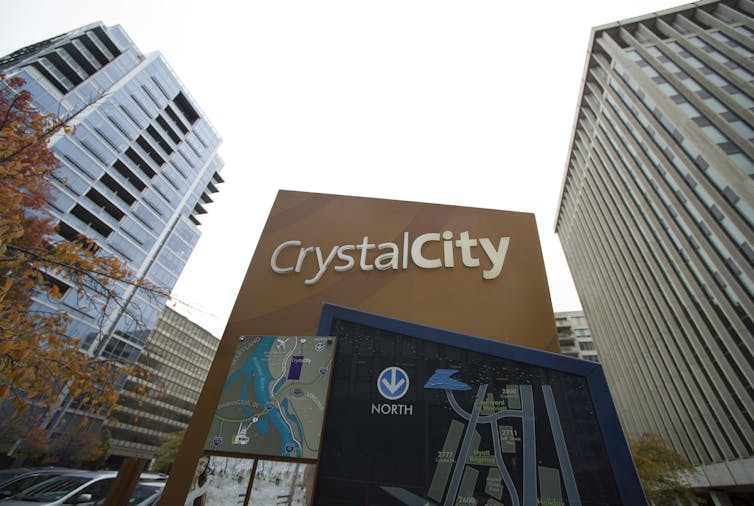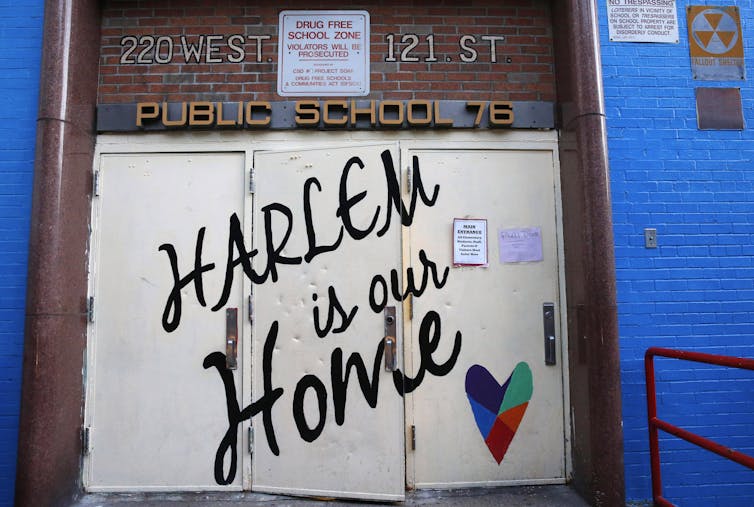What happens when a big business tries to take over and rename a neighborhood
- Written by Raechel A. Portelli, Assistant Professor of Geography, Michigan State University
What if Google tried to rename your neighborhood?
That happened to some Californians in spring 2018, when Google Maps changed the moniker of three San Francisco neighborhoods[1] – Rincon Hill, South Beach and South Market – to “East Cut.”
Given the extensive reach that Google has in the transmission of geographic data, through Google Maps and its geospatial analysis software Google Earth Engine, the name quickly spread and was adopted by other businesses, such as Uber. But residents decried the change. “It’s degrading to the reputation of our area,” one told The New York Times[2].
Neighborhood renaming is nothing new. Name changes occur when historical names no longer fit, during rebranding campaigns and through gentrification – such as when Pigtown, Brooklyn[3] was renamed Wingate. The name Pigtown originally referred to a number of pig farms located in the area. In the 2000s, the area was renamed Wingate by developers to lure in new buyers.
There are many reasons why someone might want to change their neighborhoods name, but what’s driving current name-changing initiatives carried out by big businesses with little or no personal connection to the places they rename? As a geographer, I see three main driving forces – all of which can leave longtime locals feeling upset and left out.
Marketing rebrand
Take National Landing, Amazon’s new name for Crystal City, Virginia.
The name was decided upon[4] by Amazon, local economics groups and JBG Smith, a real estate company based in Washington, D.C. The name change, revealed in Amazon’s November announcement on its new headquarters, was meant to unite the neighborhoods in Northern Virginia, Crystal City, Pentagon City and Potomac Yard areas.
However, in a Washington Post article[5], Arlington County Manager Mark Schwartz suggested that the name change would not be adopted by the local government.
In most cases, it’s not individual companies making these changes. In the case of the East Cut label, it turns out that Community Benefit District Board – made up of residential, commercial and nonprofit representatives from the area – approved the change in 2017, working with Google to come up with the label[6].
 Thanks to Amazon, Crystal City’s name may soon be on the way out.
AP Photo/Cliff Owen[7]
Thanks to Amazon, Crystal City’s name may soon be on the way out.
AP Photo/Cliff Owen[7]
Gentrification divisions
Gentrification of dilapidated urban neighborhoods[8] is a common driver of renaming.
Research in Philadelphia[9] by sociologist Jackelyn Hwang[10] shows that gentrification not only shifts the demographics of a given area, but leads to divergent definitions of neighborhoods.
Minority residents were more likely to call a wide area one neighborhood, named “South Philly.” White residents, by contrast, divided the same area into multiple neighborhoods, such as “Graduate Hospital,” “G-Ho,” “So-So,” “South Rittenhouse,” “South Square” and “Southwest Center City,” splitting up areas by their socioeconomic characteristics and crime levels.
In such cases, the use of different neighborhood definitions served to legitimize one’s presence in a community. Neighborhoods do this by evoking a sense of place[11] for residents, describing a relationship that the place has with someone’s biography, imagination and personal experiences. The names create boundaries between those who are perceived to belong to these communities – and those who do not.
Real estate ads
Another driver of neighborhood label change is the real estate market. The use of catchy names, like SoHo in Manhattan, evokes images about the type of environment you might find there. Create the right vision for a buyer, and the area might seem more appealing to them.
In Detroit, Google is also responsible for renaming neighborhoods and even inserting new names, like the Eye. The New York Times has speculated[12] that the real estate market is a likely culprit.
Real estate agents use neighborhood names in their marketing campaigns. These new labels can get picked up by companies like Google, legitimizing the changes through the company’s wide influences. In the Detroit case[13], officials created their own neighborhood map of Detroit, correcting errors in the Google Map.
In some cases, these types of changes aren’t welcome by neighborhood residents. For example, in Harlem, the Keller Williams real estate company began marketing the southern region of Harlem as SoHa without the approval of local residents.
This change spurred political action. State Senator Brian Benjamin introduced legislation in 2017[14] banning these types of unsolicited name changes.
While these name changes might seem innocuous, official neighborhood names are recognized by the U.S. Geological Survey. Neighborhoods are one example of a type of populated place that does not have official federally recognized names. What happens when these official names do not correspond to the names on the map?
 Harlem residents were not pleased with the proposed SoHa nickname.
AP Photo/Kathy Willens[15]
Harlem residents were not pleased with the proposed SoHa nickname.
AP Photo/Kathy Willens[15]
Resisting change
Neighborhoods play a critical role[16] in creating a sense of belonging and camaraderie among neighbors. They are known by their institutions, crime rates and appearance, as well as the characteristics of their population.
Neighborhood names carry strong cultural and socioeconomic expectations. In a 2015 study, people in 12 major U.S. urban areas were shown online ads for used iPhones[17]. They were less likely to respond if the ad mentioned that the seller was a resident of a disadvantaged neighborhood. That suggests that racial and socioeconomic stigmas related to a neighborhood were transferred to their residents.
Whether name changes are driven internally by community members or from external pressures from big businesses like Amazon or Google, these changes have impacts on the social and spatial patterns of urban cities[18].
For example, these types of changes can lead to increased property values, pushing out current residents. In Oakland, California, neighborhood name changes[19] have led to soaring rental prices[20], as higher-income residents from San Fransisco infiltrate the market.
I’ve seen a few successful cases of neighborhoods getting new names – usually when the renamers work together with the locals to include their opinions and celebrate their history.
For example, Nap Lab, a design collective located in Indianapolis, took on the city’s lack of neighborhood names[21]. New names like University Heights, West Indy and Poplar Grove came out of detailed analysis of city records and community documents, as well collaboration with local experts and the internet. Their map, first released in 2008, is still sold today.
This article has been updated to clarify when Pigtown was renamed.
References
- ^ changed the moniker of three San Francisco neighborhoods (www.nytimes.com)
- ^ told The New York Times (www.nytimes.com)
- ^ Pigtown, Brooklyn (en.wikipedia.org)
- ^ The name was decided upon (www.citylab.com)
- ^ in a Washington Post article (www.washingtonpost.com)
- ^ working with Google to come up with the label (www.nytimes.com)
- ^ AP Photo/Cliff Owen (www.apimages.com)
- ^ Gentrification of dilapidated urban neighborhoods (dx.doi.org)
- ^ Research in Philadelphia (www.6sqft.com)
- ^ sociologist Jackelyn Hwang (doi.org)
- ^ evoking a sense of place (doi.org)
- ^ The New York Times has speculated (www.nytimes.com)
- ^ In the Detroit case (theneighborhoods.org)
- ^ introduced legislation in 2017 (www.ny1.com)
- ^ AP Photo/Kathy Willens (www.apimages.com)
- ^ Neighborhoods play a critical role (www.press.uchicago.edu)
- ^ online ads for used iPhones (doi.org)
- ^ social and spatial patterns of urban cities (www.businessinsider.com)
- ^ neighborhood name changes (www.eastbayexpress.com)
- ^ soaring rental prices (www.eastbayexpress.com)
- ^ took on the city’s lack of neighborhood names (www.indystar.com)
Authors: Raechel A. Portelli, Assistant Professor of Geography, Michigan State University

